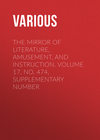Читать книгу: «The Mirror of Literature, Amusement, and Instruction. Volume 17, No. 474, Supplementary Number»
LORD BYRON
LETTERS AND JOURNALS OF LORD BYRON, WITH NOTICES OF HIS LIFE, BY THOMAS MOORE, Vol. ii
[To attempt anything like an analysis of a "great big book," of 823 pages, like the present, and that within a sheet of 16 pages, would be an effort of condensation indeed. Besides, the very nature of the volume before us will not admit of such a task being performed with much regard to accuracy or unique character. The "Letters," of which, the work is, in great part, composed, are especially ill adapted for such a purpose; since, many of them become interesting only from manner rather than importance of matter. Horace Walpole's Correspondence would make but a dull book cut in "little stars" in the letter style; and Lord Byron, as a letter writer, resembles Walpole more closely than any other writer of his time. His gay, anecdotical style is delightful—his epithets and single words are always well chosen, and often convey more than one side of the letter of a common-place mind.
Our sheet of Extracts is from such portions of Mr. Moore's volume as appear to illustrate the main points of the Noble Poet's character and habits, as the superscriptions will best explain—currente calamo from pages 22 to 769—within a few leaves of the Appendix.]
HIS SENSIBILITY
With the following melancholy passage one of his journals concludes:—
"In the weather for this tour (of thirteen days) I have been very fortunate—fortunate in a companion (Mr. H.)—fortunate in all our prospects, and exempt from even the little petty accidents and delays which often render journeys in a less wild country disappointing. I was disposed to be pleased. I am a lover of nature, and an admirer of beauty; I can bear fatigue and welcome privation, and have seen some of the noblest views in the world. But in all this—the recollection of bitterness, and more especially of recent and more home desolation, which must accompany me through life, have preyed upon me here; and neither the music of the shepherd, the crashing of the avalanche, nor the torrent, the mountain, the glacier, the forest, nor the cloud, have for one moment lightened the weight upon my heart, nor enabled me to lose my own wretched identity in the majesty, and the power, and the glory, around, above, and beneath me–."
On his return from an excursion to Diodati, an occasion was afforded for the gratification of his jesting propensities by the avowal of the young physician (Polidori) that—he had fallen in love. On the evening of this tender confession they both appeared at Shelley's cottage—Lord Byron, in the highest and most boyish spirits, rubbing his hands as he walked about the room, and in that utter incapacity of retention which was one of his foibles, making jesting allusions to the secret he had just heard. The brow of the doctor darkened as this pleasantry went on, and, at last, he angrily accused Lord Byron of hardness of heart. "I never," said he, "met with a person so unfeeling." This sally, though the poet had evidently brought it upon himself, annoyed him most deeply. "Call me cold-hearted—me insensible!" he exclaimed, with manifest emotion—"as well might you say that glass is not brittle, which has been cast down a precipice, and lies dashed to pieces at the foot!"
TO AUGUSTA
I
My sister! my sweet sister! if a name
Dearer and purer were, it should be thine,
Mountains and seas divide us, but I claim
No tears, but tenderness to answer mine.
Go where I will, to me thou art the same—
A loved regret which I would not resign.
There yet are two things in my destiny—
A world to roam through, and a home with thee.
II
The first were nothing—had I still the last,
It were the haven of my happiness;
But other claims and other ties thou hast,
And mine is not the wish to make them less.
A strange doom is thy father's son's, and part
Recalling, as it lies beyond redress;
Reversed for him our grandsire's fate of yore—
He had no rest at sea, nor I on shore.
III
If my inheritance of storms hath been
In other elements, and on the rocks
Of perils overlook'd or unforeseen,
I have sustain'd my share of worldly shocks,
The fault was mine; nor do I seek to screen
My errors with defensive paradox;
I have been cunning in mine overthrow,
The careful pilot of my proper woe.
IV
Mine were my faults, and mine be their reward.
My whole life was a contest, since the day
That gave me being, gave me that which marr'd
The gift—a fate, or will, that walk'd astray;
And I at times have found the struggle hard,
And thought of shaking off my bonds of clay:
But now I fain would for a time survive,
If but to see what next can well arrive.
V
Kingdoms and empires in my little day
I have outlived, and yet I am not old;
And when I look on this, the petty spray
Of my own years of trouble, which have roll'd
Like a wild bay of breakers, melts away:
Something—I know not what—does still uphold
A spirit of slight patience—not in vain,
Even for its own sake, do we purchase pain.
VI
Perhaps the workings of defiance stir
Within me—or perhaps a cold despair,
Brought on when ills habitually recur—
Perhaps a kinder clime, or purer air,
(For even to this may change of soul refer,
And with light armour we may learn to bear,)
Have taught me a strange quiet, which was not
The chief companion of a calmer lot.
VII
I feel almost at times as I have felt
In happy childhood; trees, and flowers, and brooks,
Which do remember me of where I dwelt
Ere my young mind was sacrificed to books,
Come as of yore upon me, and can melt
My heart with recognition of their looks:
And even at moments I could think I see
Some living thing to love—but none like thee.
VIII
Here are the Alpine landscapes which create
A fund for contemplation.—to admire
Is a brief feeling of a trivial date;
But something worthier do such scenes inspire:
Here to be lonely is not desolate.
For much I view which I could most desire,
And, above all, a lake I can behold
Lovelier, not dearer, than our own of old.
IX
Oh that thou wert but with me!—but I grow
The fool of my own wishes, and forget
The solitude which I have vaunted so
Has lost its praise in this but one regret;
There may be others which I less may show;—
I am not of the plaintive mood, and yet
I feel an ebb in my philosophy
And the tide rising in my alter'd eye.
X
I did remind thee of our own dear lake,
By the old hall which may be mine no more,
Leman's is fair; but think not I forsake
The sweet remembrance of a dearer shore:
Sad havoc Time must with my memory make
Ere that or thou can fade these eyes before;
Though, like all things which I have loved, they are
Resign'd for ever, or divided far.
XI
The world is all before me; I but ask
Of nature that with which she will comply—
It is but in her summer sun to bask,
To mingle with the quiet of her sky,
To see her gentle fare without a mask,
And never gaze on it with apathy.
She was my early friend, and now shall be
My sister—till I look again on thee.
XII
I can reduce all feelings but this one:
And that I would not;—for at length I see
Such scenes as those wherein my life begun.
The earliest—even the only paths for me—
Had I but sooner learnt the crowd to shun,
I had been better than I now can be:
The passions which have torn me would have slept:
I had not suffered, and thou hadst not wept.
XIII
With false ambition what had I to do?
Little with love, and least of all with fame;
And yet they came unsought, and with me grew,
And made me all which they can make—a name.
Yet this was not the end I did pursue;
Surely I once beheld a nobler aim.
But all is over—I am one the more
To baffled millions which have gone before.
XIV
And for the future, this world's future may
From me demand but little of my care;
I have outlived myself by many a day;
Having survived so many things that were;
My years have been no slumber, but the prey
Of ceaseless vigils; for I had the share
Of life that might have filled a century,
Before its fourth in time had passed me by.
XV
And for the remnant which may be to come
I am content; and for the past I feel
Not thankless—for within the crowded sum
Of struggles, happiness at times would steal,
And for the present I would not benumb
My feelings farther.—Nor shall I conceal,
That with all this I still can look around,
And worship Nature with a thought profound.
XVI
For thee my own sweet sister, in thy heart
I know myself secure, as thou in mine;
We were and are—I am even as thou art—
Beings who ne'er each other can resign;
It is the same, together or apart,
From life's commencement to its slow decline
We are entwined—let death come slow or fast,
The tie which bound the first endures the last!
AMOUR AT VENICE
Venice, November 17, 1816.
"I wrote to you from Verona the other day in my progress hither, which letter I hope you will receive. Some three years ago, or it may be more, I recollect you telling me that you had received a letter from our friend, Sam, dated "On board his gondola." My gondola is, at this present, waiting for me on the canal; but I prefer writing to you in the house, it being autumn—and rather an English autumn than otherwise. It is my intention to remain at Venice during the winter, probably, as it has always been (next to the east) the greenest island of my imagination. It has not disappointed me; though its evident decay would, perhaps, have that effect upon others. But I have been familiar with ruins too long to dislike desolation. Besides, I have fallen in love, which, next to falling into the canal (which would be of no use, as I can swim,) is the best or the worst thing I could do. I have got some extremely good apartments in the house of a "Merchant of Venice," who is a good deal occupied with business, and has a wife in her twenty-second year. Marianna (that is her name) is in her, appearance altogether like an antelope. She has the large, black, oriental eyes, with that peculiar expression in them, which is seen rarely among Europeans—even the Italians—and which many of the Turkish women give themselves by tinging the eyelid—an art not known out of that country, I believe. This expression she has naturally—and something more than this. In short, I cannot describe the effect of this kind of eye—at least upon me. Her features are regular, and rather aquiline—mouth small—skin clear and soft, with a kind of hectic colour—forehead remarkably good; her hair is of the dark gloss, curl, and colour of Lady J–'s; her figure is light and pretty, and she is a famous songstress—scientifically so; her natural voice (in conversation, I mean,) is very sweet; and the naiveté of the Venetian dialect is always pleasing in the mouth of a woman.
November 23.
You will perceive that my description, which was proceeding with the minuteness of a passport, has been interrupted for several days. In the meantime.
December 5.
Since my former dates, I do not know that I have much to add on the subject, and, luckily, nothing to take away; for I am more pleased than ever with my Venetian, and begin to feel very serious on that point—so much so, that I shall be silent.
By way of divertisement, I am studying daily, at an Armenian monastery, the Armenian language. I found that my mind wanted something craggy to break upon; and this—as the most difficult thing I could discover here for an amusement—I have chosen, to torture me into attention. It is a rich language, however, and would amply repay any one the trouble of learning it. I try, and shall go on;—but I answer for nothing, least of all for my intentions or my success. There are some very curious MSS. in the monastery, as well as books; translations also from Greek originals, now lost, and from Persian and Syriac, &c.; besides works of their own people. Four years ago the French instituted an Armenian professorship. Twenty pupils presented themselves on Monday morning, full of noble ardour, ingenuous youth, and impregnable industry. They persevered with a courage worthy of the nation and of universal conquest, till Thursday; when fifteen of the twenty succumbed to the six and twentieth letter of the alphabet. It is, to be sure, a Waterloo of an Alphabet—that must be said for them. But it is so like these fellows, to do by it as they did by their sovereigns—abandon both; to parody the old rhymes, "Take a thing and give a thing"—"Take a king and give a king. They are the worst of animals, except their conquerors.
I hear that that H–n is your neighbour, having a living in Derbyshire. You will find him an excellent hearted fellow, as well as one of the cleverest; a little, perhaps, too much japanned by preferment in the church and the tuition of youth, as well as inoculated with the disease of domestic felicity, besides being overrun with fine feelings about women and constancy (that small change of love, which people exact so rigidly, receive in such counterfeit coin, and repay in baser metal;) but, otherwise, a very worthy man, who has lately got a pretty wife, and (I suppose) a child by this time. Pray remember me to him, and say that I know not which to envy most—his neighbourhood, him, or you.
Of Venice I shall say little. You must have seen many descriptions; and they and they are most of them like. It is a poetical place; and classical, to us, from Shakspeare and Otway. I have not yet sinned against it in verse, nor do I know that I shall do so, having been tuneless since I crossed the Alps, and feeling, as yet, no renewal of the "estro." By the way, I suppose you have seen "Glenarvon." Madame de Staël lent it me to read from Copet last autumn. It seems to me that, if the authoress had written the truth, and nothing but the truth—the whole truth—the romance would not only have been more romantic, but more entertaining. As for the likeness, the picture can't be good—I did not sit long enough. When you have leisure, let me hear from and of you, believing me ever and truly yours most affectionately.





















